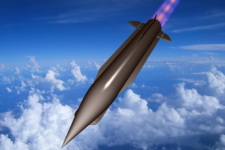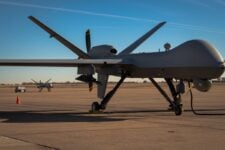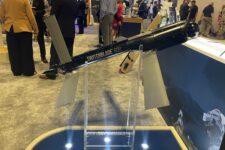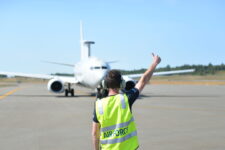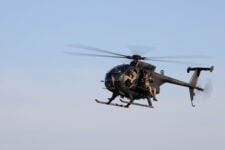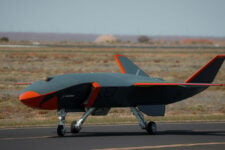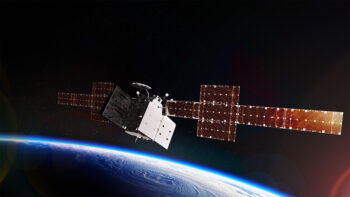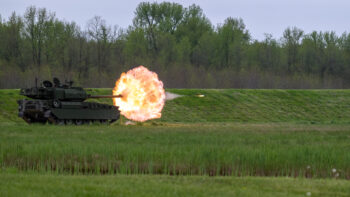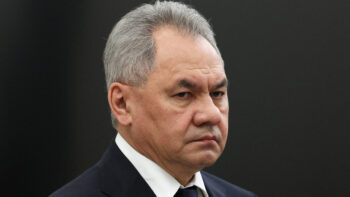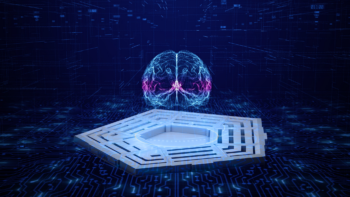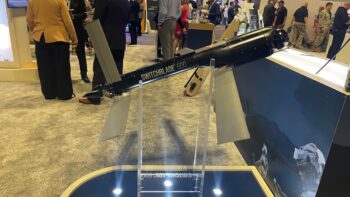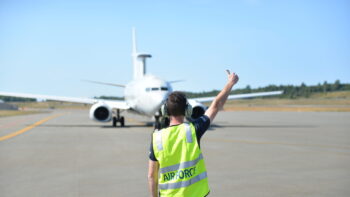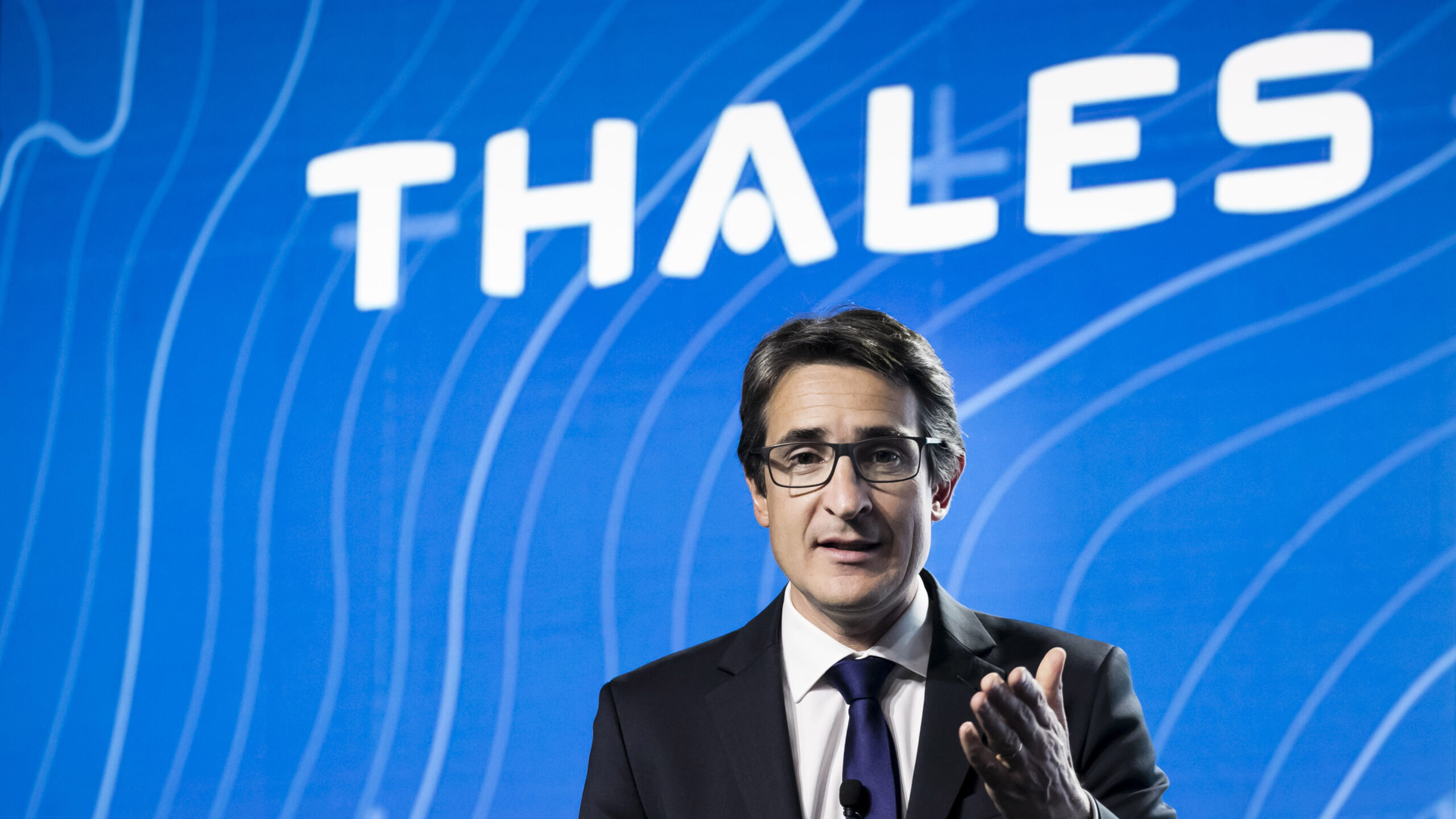
PARIS, FRANCE – MAY 23: Thales CEO, Patrice Caine attends the Thales group general shareholders meeting on May 23, 2018 in Paris, France. The electronics group specializing in aerospace, defense, security and ground transportation now relies on big data, AI and cybersecurity to stand out. (Photo by Vincent Isore/IP3/Getty Images)
IDEX 2023 — Once relegated to an assumption, gaining air superiority is back at the forefront of the minds of European strategic planners in the wake of the fighting in Ukraine, according to Patrice Caine, CEO of the French defense firm Thales.
“Earlier the air supremacy concept was not a priority for many countries, especially in Europe,” he told Breaking Defense while at IDEX 2023 in Abu Dhabi last week. “However, we have now discovered that protecting the air space is clearly of the utmost importance.”
That should translate, he said, in future opportunities for Thales not only in Europe, but in the Middle East where the company hopes to expand its business, even as countries make strict demands on local versus foreign production. Caine also discussed the challenges and strategies surrounding collaborative combat clouds – an essential ingredient in what American officials call Joint All Domain Command and Control (JADC2), and the future of warfare.
This interview was edited for length and clarity.
Breaking Defense: As the new era of warfare evolves, new concepts of air supremacy have emerged around the world and in Europe, in particular since the conflict started in Ukraine. How does Thales intend to contribute to the future of air supremacy in Europe?
Patrice Caine: Earlier the concept of air supremacy was not a priority in many countries, especially in Europe. However, we have now discovered that protecting the air space is clearly of the utmost importance. In this domain, Thales is one of the few companies in the world mastering two important parts of the air defense systems. The first is threat detection through cutting-edge radars… and second is command and control.
Once you’ve detected the threat, the issue becomes how to deal with it. Thales provides a full-spectrum to protect air space, from sensors to effectors, embracing whatever the system approach or the system layer to put all these information together.
In Europe, Thales has been making strides in air supremacy, especially as a key player in France and Italy on short and medium range air defense systems. This is the case in the Middle East as well, where Thales is called to help countries to deal with newly evolving threats related to drones or UAVs.
These kind of threats needs specific measures to be dealt with because the drones are usually smaller than aircraft and fly at a lower altitude. It is also harder for a radar to detect slow moving targets. But we have developed the right radar family to address this new type of threat.
The combat cloud concept is being developed to link all assets on land, sea air, cyber and even space. How do you view the combat cloud, and what is Thales developing in this aspect to take part in the collaborative combat cloud [market]?
The notion of collaborative combat is centered around how we share the data between platforms and between media — data coming from warships, satellites, and the troops on the ground. How and where do you compute this data? That’s why there is also this notion of edge computing. To avoid putting [all the] data in the cloud, you would need huge bandwidth to transmit the data in the same cloud. This can be quite a challenge in terms of bandwidth. It’s smarter to compute locally what needs to be computed locally and to share only what needs to be shared.
This technology needs an end-to-end connectivity to transmit the data in a highly secure mode. In the miliary world, there are not always available networks, so you need to bring your own network and that’s quite a difference. [To do that, we use] data analytics and AI, noting that artificial intelligence is embedded in almost all our products.
After the data is collected, the integrated Thales systems start to develop an algorithm, either for data analytics or for AI, for data processing.
Knowing that the Middle East is one of the major markets for Thales, what are the main focal points Thales concentrates on, and plans to in the future? And is Thales ready to transfer technology in accordance with Vision 2030 [mandates] in the region?
In fact, our strategy is fully aligned with Vision 2030 in KSA [Saudi Arabia] and Vision 2040 in UAE, and we have been operating in line with it for many years now. We are trusted technological partners to the countries in the region. Hence building on this, you will find that we implement the most advanced technologies locally in the countries in which we operate.
Thales really intends to continue to grow locally. The old business model was to export from France or other Western countries. But now, in line with the national visions, localization is an important priority. Our strategy is to grow skills and competencies in the Middle East and Gulf region, leveraging the technologies from our Western footprint.
Thales is a company that countries in the region can rely on to grow sovereignty and independence. To do so, we focus on growing local skills, local talent base and local intellectual property, IP.
As countries mature this notion of sovereignty, they really see that what is important is the real intellectual property that you develop in the country.
After the Covid-19 pandemic, business models have changed and ESG (Environmental, Social, and Governance) and war for talent have become more important in the sector. What do you think about the ESG and the war for talent in Europe and France? And how is Thales paving its path to find the required talent in France and in all other countries it is present in?
ESG has become an essential topic for all companies in the world and especially companies involved in the defense sector. So, a while ago, we looked at ourselves and tried to answer to this very simple question: how do our activities contribute to some key societal challenges?
We have identified three societal challenges: to make the world safer, greener, and more inclusive.
In terms of making the world safer, we are looking at the digital space. Thales is well identified as a defense player, but less well-known in the field of cybersecurity, as the market is immense. We have chosen our battle and we have become a world leader in data management and security, securing 19 out of the 20 most important banks in the world in terms of data management and encryption.
Regarding greener… Thales has developed solutions to optimize the flight trajectory of the plane [and cut down emissions].
Lastly, to make the world more inclusive, I’ll give you two examples of where we’re developing our strengths. First, we want to bring an identity to each and every person in the world. This may seem obvious to you and me – having an identity card or passport. This allows us to vote, drive, gives us access to social benefits and so on. However, a recent study from the IMF showed that one billion people on Earth do not have a firm method to establish their identity. They cannot prove who they are. Our Digital Identity and Security business has developed a system on behalf of governments in many countries, and this is a focus for us.
The second example is reducing the digital divide. We have seen this during the COVID crisis. We have to live, study, work and do almost everything from home. Without decent connectivity, it would be impossible to do anything. When you live in a city, it’s okay. However, those who live in the countryside are at a disadvantage. Unfortunately, reliance on fiber optics is not economically feasible for many remote places. The solution is to bring internet through space – through satellites. What we have launched recently is an advanced satellite that gives users a service similar to that which fiber optics would give them. This greatly reduces the digital divide and makes the world more inclusive.

